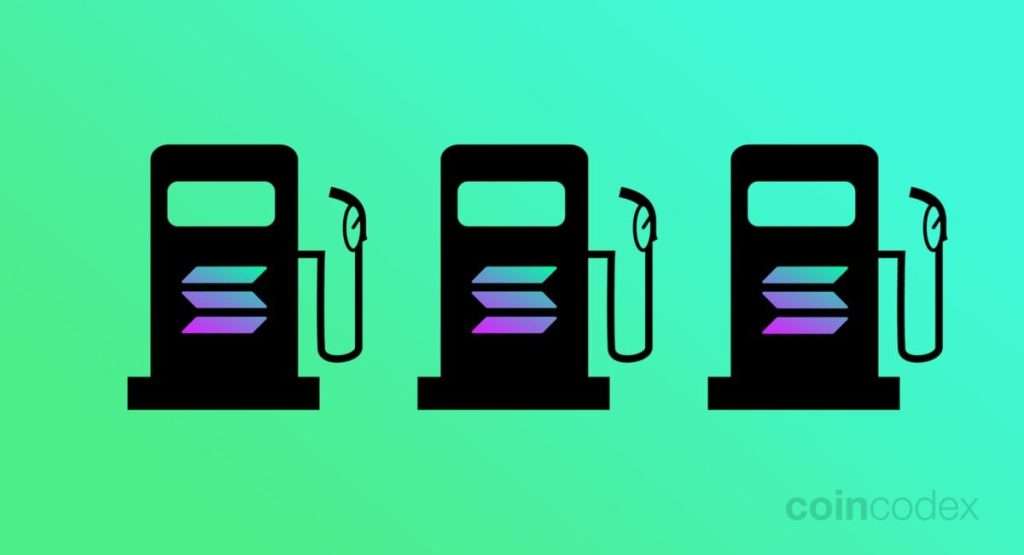DOES SOLANA HAVE GAS FEES; Solana, a fast-growing blockchain platform, has gained significant attention in the world of cryptocurrencies due to its high transaction speed and scalability. As more users explore the possibilities of the Solana ecosystem, one common question arises: Does Solana have gas fees? In this article, we will delve into the concept of gas fees, how they apply to different blockchain networks, and discuss the transaction costs associated with using the Solana network.
DOES SOLANA HAVE GAS FEES

Understanding Gas Fees
Gas fees are transaction costs required to execute operations on blockchain networks. They serve as an incentive for miners or validators who validate and process transactions on the network. Gas fees vary depending on the complexity and computational resources required for a transaction. In many blockchain networks like Ethereum, gas fees are denominated in the network’s native cryptocurrency.
Gas Fees on the Solana Network
Unlike some other blockchain networks, such as Ethereum, Solana operates on a different consensus mechanism called Proof-of-History (PoH), combined with Proof-of-Stake (PoS). This unique approach allows Solana to achieve high throughput and low transaction fees.
On the Solana network, transactions are processed through validators who reach consensus on the order and validity of transactions. Solana employs a fee mechanism called “rent,” which is designed to prioritize resource allocation and prevent spam attacks on the network. Rent fees are determined based on the amount of computational resources utilized by a transaction and the duration of data storage on the network.
While Solana does have transaction fees, they are generally significantly lower compared to other blockchain networks. The network’s high throughput enables fast transaction processing, and the low fees make it an attractive choice for users who seek cost-effective and efficient transactions.

Factors Affecting Solana Transaction Fees
- Computational Complexity: The complexity of the transaction and the computational resources required directly impact the transaction fee. More complex operations or smart contracts may incur higher fees.
- Network Congestion: Similar to other blockchain networks, Solana’s transaction fees can vary depending on network congestion. During periods of high demand, when the network is heavily utilized, transaction fees may increase.
- Token Swaps and Interactions: Transactions involving token swaps, decentralized exchanges, or interacting with smart contracts may involve additional fees beyond the base transaction cost.
Managing Solana Transaction Fees
To optimize transaction costs on the Solana network, consider the following strategies:
- Timing: Monitor network activity and try to execute transactions during periods of lower congestion to minimize fees.
- Gas Optimization: Ensure efficient usage of computational resources by optimizing smart contracts and transactions, reducing unnecessary operations or complex calculations.
- Fee Estimation: Utilize tools and platforms that provide fee estimation services to estimate transaction costs before executing them.
- Gas Tokens: Stay updated on developments within the Solana ecosystem, as projects may introduce gas tokens or mechanisms to optimize transaction costs further.
How To Exchange Solana for Fiat on Astro Africa

Astro Africa is undoubtedly one of the most fantastic cryptocurrency exchanges to come out of the Nigerian cryptocurrency ecosystem. It is a platform that embodies the definition of profitable, fantastic user experience, security, and transparency. Astro Africa allows users to exchange their cryptocurrency assets for Naira or Cedis (plans are in motion to expand to other parts of Africa). They provide services such as:
- Exchange cryptocurrency for fiat.
- Direct local deposits.
- Exchange gift cards for fiat.
- Exchange gift cards for crypto.
- An exchange rate calculator.
- High exchange rate for converting assets.
The list goes on and on. All these are made available to users easily, all you need is an internet-accessible mobile phone. They also have a mobile application available for just Android users for now. The amazing thing about Astro Africa is that users are entirely in charge of their portfolios and do not need to hold their assets on the platform before they can trade and withdraw their fiat directly to their local bank accounts free of charge. This makes users focus more on trading and not have to worry too much about how their fiat is being moved around when they need it.
Together with the awesomeness of Astro Africa mentioned above, the signup process is one of the most seamless and straightforward processes ever:
- Proceed to the Astro Africa signup page, and complete all the required details.
- Once the step above is completed, you’ll instantly receive a confirmation code in your email. Copy this code and complete your signup.
- Once you’re done, you are required to set up a five-digit (5) transaction pin. It’s that easy, you can now start trading or you can explore the sleek user interface.
- Make sure you complete your profile by adding your bank account and other necessary details to ensure a maximum pleasurable user experience.
- Next, ensure to convert your Solana to a Stablecoin like USDT, USDC, BUSD, etc.
- Next, proceed to select “Sell Crypto”. You first select the amount of crypto you wish to sell (minimum $5). For now, you can only exchange Bitcoin (development is already in progress for supporting other assets).
- You can see the exchange rate, the amount you will receive in fiat also, and the wallet address for you to send your assets to. After 2 block confirmations, your Astro Africa wallet is credited with fiat you can proceed to withdraw to your local bank account.
You can always learn more about How To Trade on Astro Africa and read their blog on various posts about how to trade various gift cards and cryptocurrencies effectively. It is an exciting innovation that has come to stay.
The Solana network offers a compelling solution for fast, scalable, and cost-effective transactions. While Solana does have transaction fees, they are generally lower compared to other blockchain networks, thanks to its innovative consensus mechanism and high throughput capabilities. Understanding the factors that influence Solana transaction fees and implementing strategies to manage and optimize these costs can help users make the most of their experience on the Solana network.
Disclaimer: The information provided in this article is for informational purposes only and should not be considered as financial or investment advice. It is essential to conduct thorough research and seek professional advice before engaging in cryptocurrency transactions or investments.



